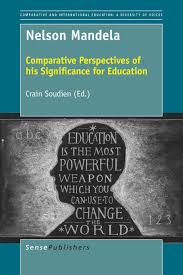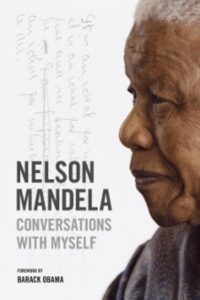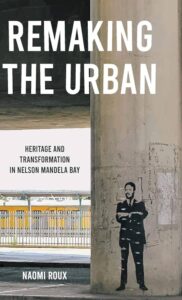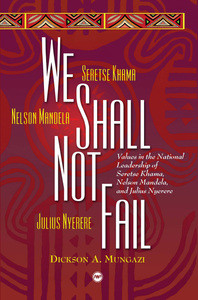July 18 was Nelson Mandela International Day. This post highlights his contributions and continuous legacy. Nelson Mandela International Day celebrates the legacy of Nelson Mandela, South Africa’s first Black president, political leader and activist. Mandela’s teachings have encouraged people to make a positive impact in their communities. Mandela’s dedication to nonviolent resistance, even when facing severe oppression, is a philosophy embraced by American civil rights leaders and continues to inspire many activists.
Here are four books from the Rutgers Collection that highlight Mandela’s strong leadership and social justice activism, propelling many Americans to do the same.
 Nelson Mandela: Comparative Perspectives of His Significance for Education by Crain Soudein – Link to Read
Nelson Mandela: Comparative Perspectives of His Significance for Education by Crain Soudein – Link to Read
This book explores the profound impact of Nelson Mandela’s life and values on education. Edited by Crain Soudien, the book is a collective effort by scholarly professionals from the World Council of Comparative Education Societies, who reflect on Mandela’s legacy after his death in 2013. The authors describe Mandela’s dedicated commitment to human dignity, respect for diversity and justice, arguing the importance of these principles to modern education. The book addresses how these values can shape educational practices, promote social justice, and foster environments to strengthen respect and equality. Mandela’s life serves as a powerful example of education as a tool for personal and societal transformation, challenging educators to rethink their approaches in creating inclusive and equitable learning spaces.
 Conversations with Myself by Nelson Mandela – Link to Read
Conversations with Myself by Nelson Mandela – Link to Read
This biographical memoir describes an intimate glimpse into the private thoughts and reflections of one of the most accomplished leaders of our time. Compiled from Mandela’s personal archives, the book includes letters, diary entries, notes, and recorded conversations spanning his early political activities, 27 years of imprisonment, and his presidency. This collection provides a unique, unfiltered look at Mandela’s experiences and thoughts, revealing the humanity behind the iconic figure. With a foreword by former president Barack Obama, the book allows readers to understand Mandela’s personal trials and tribulations, making it a deeply moving and insightful narrative of his life.
- Remaking the Urban: Heritage and Transformation in Nelson Mandela Bay by Naomi Roux – Link to Read
 Naomi Roux’s publication shows the complex relationship between post-apartheid urban transformation and tradition in the Nelson Mandela Bay Metro area, located in South Africa’s Eastern Cape. The book uses the city as a case study example to explore how memory and history are intertwined into the South African landscape. Roux examines key points like memorial constructions, forced removals, public art, and the politics of recognition, highlighting how these assets contribute to the ongoing process of shaping community memory and identity in a divided city. This book does a great job of analyzing the dynamics of heritage and transformation. Roux provides insightful critiques into how cities can honor and respect their past while fostering inclusive and equitable urban futures. It also gives a good perspective on how Nelson Mandela’s work from years prior has inspired the South African community of today.
Naomi Roux’s publication shows the complex relationship between post-apartheid urban transformation and tradition in the Nelson Mandela Bay Metro area, located in South Africa’s Eastern Cape. The book uses the city as a case study example to explore how memory and history are intertwined into the South African landscape. Roux examines key points like memorial constructions, forced removals, public art, and the politics of recognition, highlighting how these assets contribute to the ongoing process of shaping community memory and identity in a divided city. This book does a great job of analyzing the dynamics of heritage and transformation. Roux provides insightful critiques into how cities can honor and respect their past while fostering inclusive and equitable urban futures. It also gives a good perspective on how Nelson Mandela’s work from years prior has inspired the South African community of today.
- We shall not fail : values in the national leadership of Seretse Khama, Nelson Mandela, and Julius Nyerere by Dickson A. Mungazi – Link to Read
 Nelson Mandela’s leadership not only encouraged politicians and leaders worldwide, but it also inspired those close to home. African leaders such as Seretse Khama and Julius Nyerere had similar perspectives to Mandela that could be addressed as a comparison. Seretse Khama, the first President of Botswana (1966-1980), believed in a multiracial democracy after gaining independence from Great Britain. Being a young president at the time, Khama introduced many new ideas to improve his government, creating an authentic leadership style. Julius Nyerere of Tanzania was the President of the United Republic of Tanzania from the time the country was founded in 1964 until his early retirement in 1985. He was the first African head of state to retire early, due to his socialist policies supporting communal farms and the defectiveness of state ownerships. Although his economic policies failed, that did not mean that Nyerere did not have strong leadership for his country. He was convinced that socialism was the way for Tanzania to survive as a nation. His modest lifestyle, moral authority, and clean record of scandal and corruption gave way for future African leaders to follow in his footsteps. Mungazi argues that the shared values of Khama, Nyerere, and Mandela were necessary to contribute towards their successful leadership. Their significant implications showcased improvement on national development and political stability in their respective countries. All three of these famed African leaders show various methods of leadership styles.
Nelson Mandela’s leadership not only encouraged politicians and leaders worldwide, but it also inspired those close to home. African leaders such as Seretse Khama and Julius Nyerere had similar perspectives to Mandela that could be addressed as a comparison. Seretse Khama, the first President of Botswana (1966-1980), believed in a multiracial democracy after gaining independence from Great Britain. Being a young president at the time, Khama introduced many new ideas to improve his government, creating an authentic leadership style. Julius Nyerere of Tanzania was the President of the United Republic of Tanzania from the time the country was founded in 1964 until his early retirement in 1985. He was the first African head of state to retire early, due to his socialist policies supporting communal farms and the defectiveness of state ownerships. Although his economic policies failed, that did not mean that Nyerere did not have strong leadership for his country. He was convinced that socialism was the way for Tanzania to survive as a nation. His modest lifestyle, moral authority, and clean record of scandal and corruption gave way for future African leaders to follow in his footsteps. Mungazi argues that the shared values of Khama, Nyerere, and Mandela were necessary to contribute towards their successful leadership. Their significant implications showcased improvement on national development and political stability in their respective countries. All three of these famed African leaders show various methods of leadership styles.
I hope these books help you know more about Nelson Mandela’s legacy and his useful theories about leadership on this special day. Happy Nelson Mandela International Day!